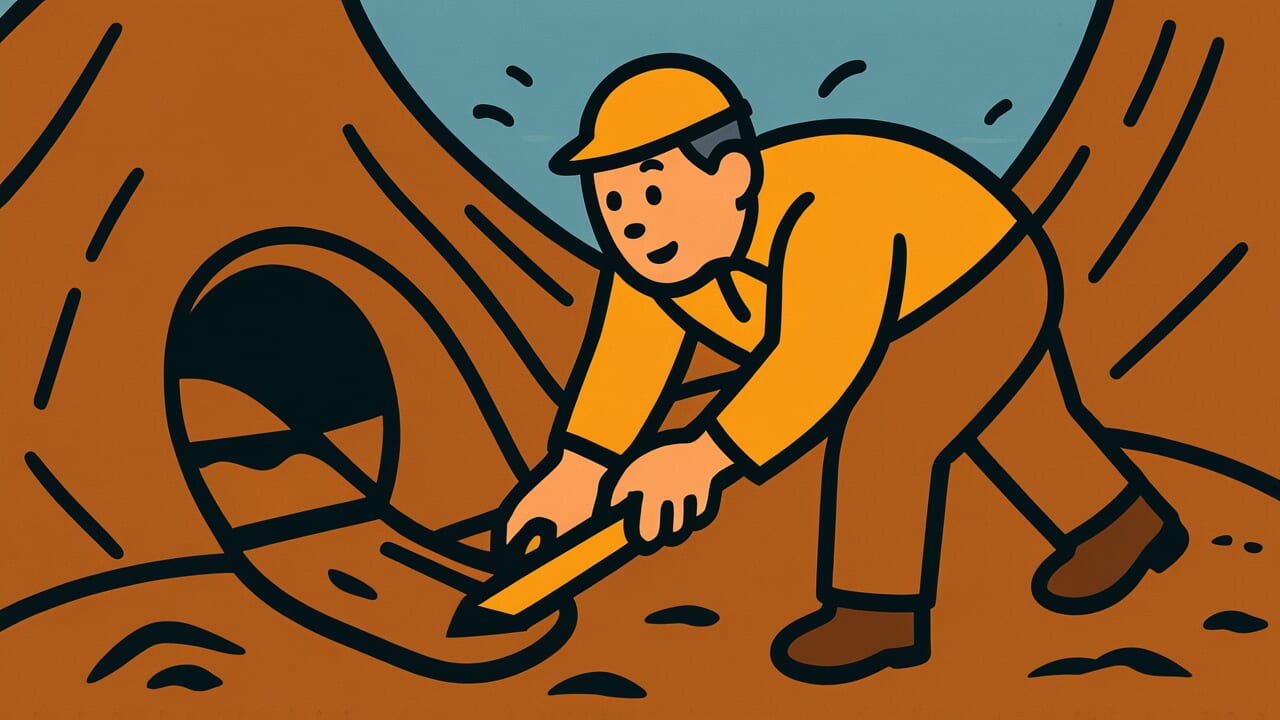How to Read “Dig a hole and say it in”
Ana wo hotte ii iru
Meaning of “Dig a hole and say it in”
“Dig a hole and say it in” is a proverb about keeping secrets you can never tell anyone else locked away in your heart.
Literally, it means digging a hole in the ground, speaking your secret into that hole, and then burying it with dirt.
This proverb is used when showing determination to protect an important secret. It also describes situations where you suppress the urge to confide in someone and maintain silence.
It expresses the virtue of being trustworthy and tight-lipped, never betraying someone’s confidence.
Even today, there are many situations where you must protect information that shouldn’t be shared. Business secrets, worries friends confide in you, family matters—these all require discretion.
In an age when people can share anything on social media, the importance of “the resolve to keep secrets” that this proverb teaches has only grown stronger.
Origin and Etymology
There are no clear written records about the origin of this proverb. However, we can understand its fascinating background from how the expression was formed.
In ancient China and Japan, people who carried secrets they couldn’t tell anyone would actually dig holes in the ground. They would speak their secrets into these holes and cover them with dirt.
This was likely a ritual act to release themselves from psychological pressure.
Particularly interesting is a story from ancient Chinese tales similar to “The King Has Donkey Ears.” A barber learned the king’s secret and suffered from being unable to tell anyone.
In his anguish, he dug a hole in a bamboo grove and shouted the secret into it. Similar stories existed widely throughout East Asian cultures.
In Japan too, carrying worries and secrets you couldn’t share was a heavy mental burden. But revealing them to others would destroy trust and sometimes even endanger lives.
So people would go to deserted places and speak into holes to lighten their emotional load a little. This act became symbolic of keeping secrets completely, which is how it became a proverb.
Usage Examples
- What she confided in me, I kept to myself as if to dig a hole and say it in—I told no one
- The news of the management crisis I heard from the president, I can only dig a hole and say it in
Universal Wisdom
The proverb “Dig a hole and say it in” reveals a fundamental human contradiction. It shows the conflict between wanting to tell someone a secret and the responsibility to keep it.
Carrying a secret is a heavier burden than you might imagine. Psychologically, keeping secrets creates stress that affects both mind and body.
That’s why people want to tell someone. This impulse is natural.
But at the same time, human society is built on trust. People who can’t keep secrets lose credibility and find it difficult to live within their community.
Behind this proverb lies our ancestors’ deep understanding of human nature. They knew the suffering of carrying secrets.
That’s why they used the symbolic act of speaking into a hole to lighten their emotional burden a little.
It was a last-resort wisdom that hurt no one and betrayed no trust.
This proverb has been passed down through generations because as long as humans are social creatures, we cannot escape this conflict.
The weight of keeping secrets and the nobility of maintaining that integrity despite the burden—our ancestors understood both sides.
Their insight remains relevant today.
When AI Hears This
When you consider the phenomenon of falling into a hole you dug yourself through thermodynamics, it matches physical laws surprisingly well.
The second law of thermodynamics states that “entropy in an isolated system always increases.”
Simply put, this means “once something becomes disordered, it won’t naturally return to order.”
Let’s take someone who told a lie as an example. The first lie is a small information discrepancy.
But to hide it, they pile on more lies, and the information inconsistencies increase exponentially.
In other words, the disorder of the entire system—its entropy—rises sharply. In physics, higher entropy states are more stable and harder to reverse.
That’s why lies snowball and eventually become a hole that traps you.
What’s interesting is that this process is irreversible. Just as you can’t restore a broken egg to its original shell, the chaos created by words or actions once released cannot be erased without reversing time.
Moreover, in thermodynamics, reducing entropy requires inputting energy from outside. In other words, escaping from a hole you dug yourself requires enormous effort like apologizing and explaining.
On a cosmic level, self-destruction is a natural consequence of following physical laws.
Lessons for Today
What this proverb teaches you today is the weight and nobility of protecting trust.
In our information-saturated age, even small secrets can easily spread on social media.
That’s precisely why people who can keep secrets have become more valuable.
Worries friends confide in you, confidential information you learn at work, family matters—you surely have information around you that must never be shared.
Keeping it protected may sometimes be painful. There will be moments when you want to tell someone.
But that silence is what proves your integrity.
If carrying a secret becomes too difficult, remember this proverb. People in the past actually dug holes and spoke into them to lighten their hearts.
As a modern person, you can find balance by writing in a locked diary or speaking aloud where no one can hear.
What matters is maintaining the line of not revealing it to others.
That integrity builds trust in you and nurtures deep human relationships.



Comments